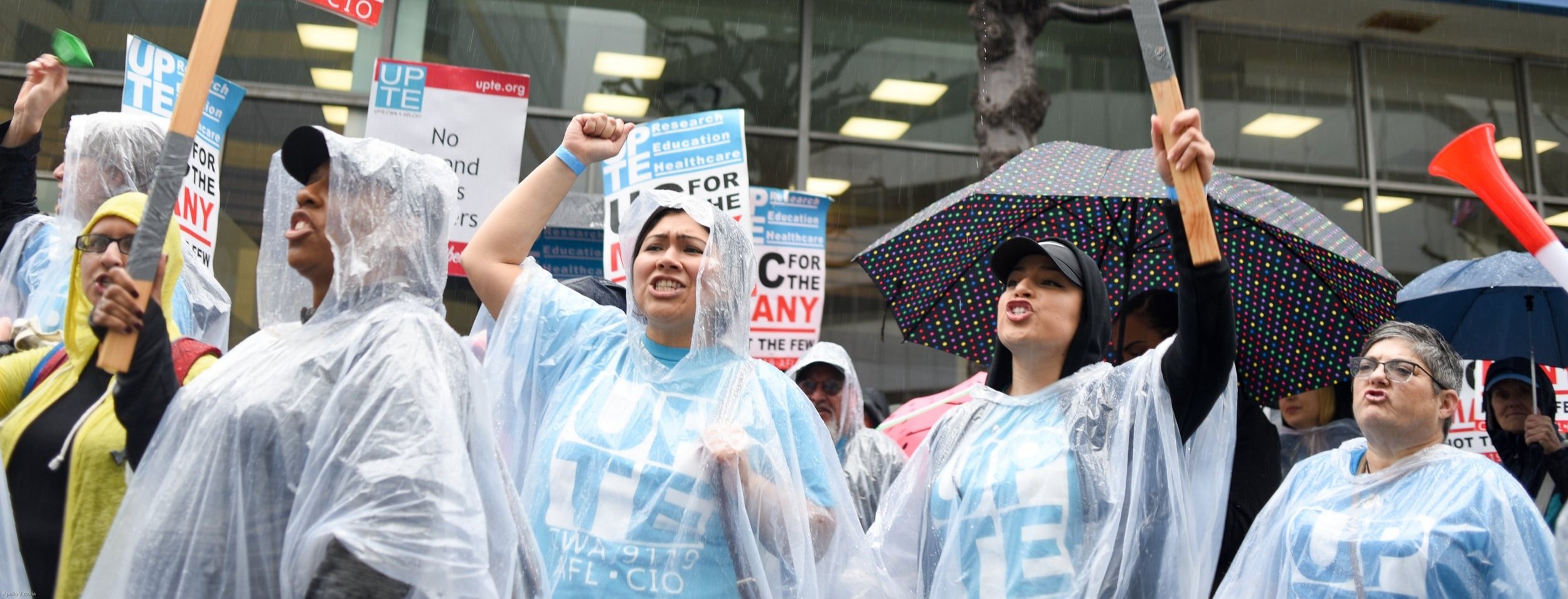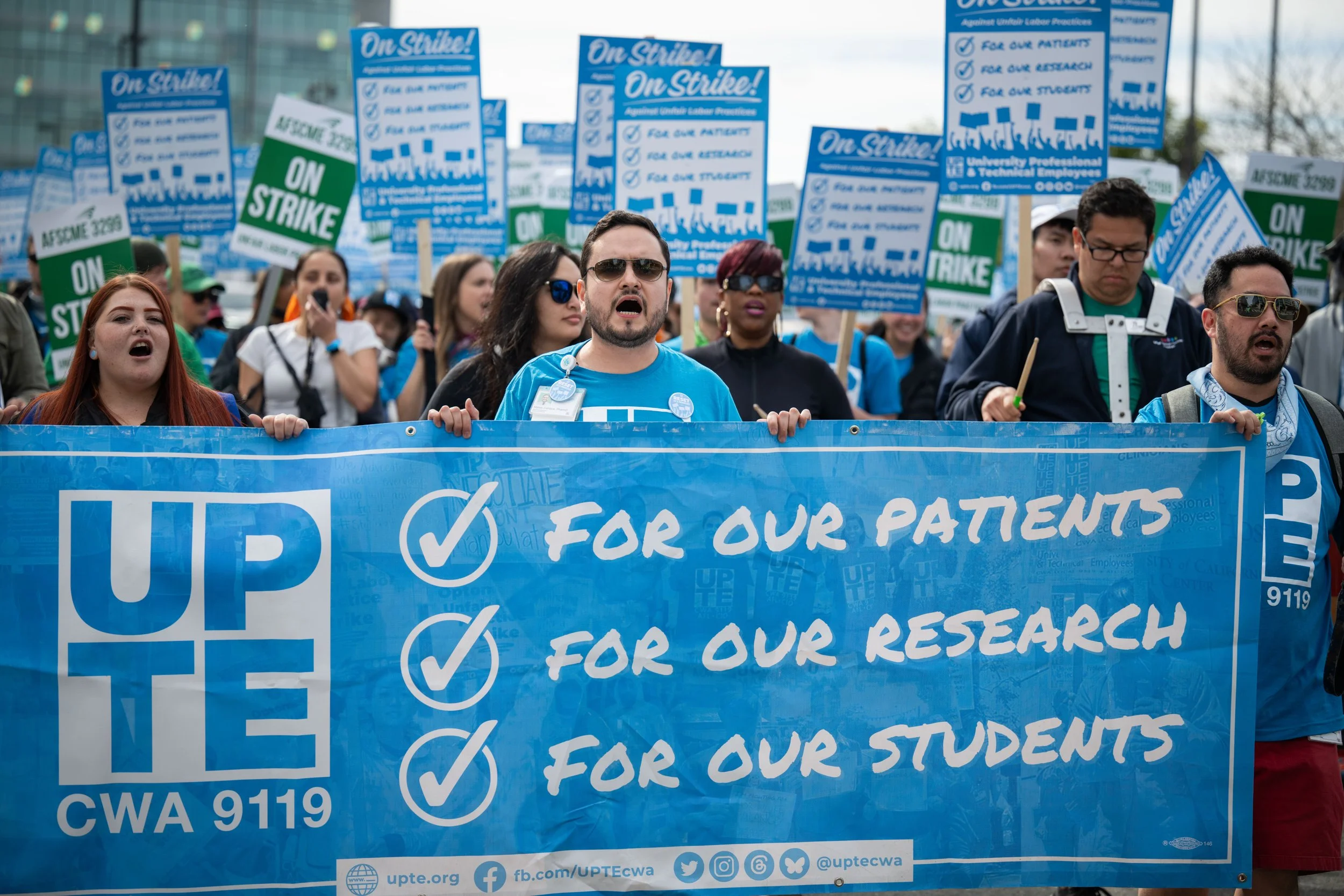

Get the Facts
We have been bargaining with the University of California since June of 2024. After our 24th day of bargaining, the University showed no intention to address our priorities nor to take their legal obligations more seriously. On December 11, we informed the University that we believe negotiations are no longer productive and that we should begin an 'impasse' process required by the Public Employment Relations Board.
UC's refusal to bargain in good faith demonstrates a lack of respect for the important work all 22,000 of us do. By failing to address the growing staffing crisis in our hospitals, labs, and campuses, UC executives are jeopardizing patient care, research, and education. UC negotiators' behavior has made crystal clear that we need to keep building pressure to force UC decision-makers to change course.
Facts About UPTE-UC Negotiations
UPTE spent 24 days at the bargaining table over the course of 6 months prior to declaring impasse. UC did not contest that the parties were at an impasse.
UC rejected entirely the following proposals that thousands of UPTE members made clear were top priorities through our bargaining survey and attendance at bargaining sessions. UC provided no meaningful explanation for their rejection, despite similar agreements with other unions and industry standards.
Objective Criteria & Enforceability for Reclassification Process
Alternatives to Layoff, Limits on Outsourcing (Similar UC Agreements with AFSCME & CNA)
Improved Paid and Unpaid Time Off (Similar UC Agreements with AFT & CNA, Industry Standard)
Equal Raises for Lawrence Berkeley National Lab (Similar UC Agreement with AFSCME & Teamsters)
UC has not provided essential information, including staffing and vacancy rates for UPTE job titles, to which we are entitled by law. In the few cases where they have responded, the information has been partial and inadequate.
Symptoms of UC’s Staffing Crisis
54% and 76% of UPTE healthcare and research professionals have been at UC for less than 5 years (1)
UCSF’s average length of patient stay (ALOS) has increased up to 40% between 2018 and 2023 and is 60% higher than the state average. (2)
In UCSD-Hillcrest, in 2023, 5.6% of ER patients left without being seen, an increase from 4.1% in 2019, and more than twice as high as the state average of 2.6%. (3)
UCSF declined 41% of transfer requests from other hospitals in 2022, and UCD declined 57% in 2023. (4)
The UC Davis’ California Animal Health & Food Safety (CAHFS) biotechnology lab, responsible for avian flu testing, has experienced significant turnover and short-staffing due to low pay, improper classification, lack of career growth, and overwork [read more from the Los Angeles Times].
55% of Clinical Research Coordinators at UCSD Moores Cancer Center have worked less than two years–leading to potential safety concerns for patients in clinical trials as documented in this article from The San Diego Union-Tribune from June 30, 2023.
Making sense of UC’s “fake facts”
UC: “Consistent with previous contracts, regular step increases (roughly 2%) throughout the contract. Step increases for RX and TX bargaining unit employees have been expedited.”
The Facts: UC is offering only 2 step increases over 3 years for RX and TX, who are already some of the lowest paid employees at UC and who have had only 2 step increases in 9 years. UC has agreed to or proposed annual steps in current contracts for HX, NX, CX, SX, and EX units.
UC: “Streamlined reclassification and appeals processes to facilitate career growth.”
The Facts: UPTE has made clear that UC needs to address a lack of objective criteria and an enforceable process for reclassification. UC’s “streamline” would only provide a timeline for them to respond to reclassification requests, which will not improve outcomes if criteria remain subjective and there is no ability to appeal to an independent arbiter.
UC: “In December, after UC presented several proposals, UPTE unexpectedly no-showed for the final bargaining session. Despite the no-show and without responding to UC's offers, UPTE declared an impasse shortly after that, which means that the union declared discussions had broken down.”
The Facts: After spending 24 days at the bargaining table, UPTE notified UC that we were declaring impasse during our final scheduled bargaining session. At the California Public Employee Relations Board, UC did not contest that the parties were at an impasse.
UC: “265 Lawrence Berkeley National Laboratory employees will receive a 5% raise in October 2025 and 3% in the second and third years.”
The Facts: UC proposes that these raises be distributed unequally, at management’s discretion. Unlike all other UPTE workers, those at LBNL would have no guaranteed raises. No other UC union has agreed to this: all other union workers at LBNL receive guaranteed raises.
UC’s Unfair Labor Practices
Bad Faith Bargaining
UC’s bargaining team does not have sufficient bargaining authority. Often, they cannot answer basic questions about their proposals, saying that they have to confer with “the University” prior to answering.
They are refusing to bargain over pay scales for titles that have joined the union recently and over housing benefits that the University already provides to Executives.
They have made predictably unacceptable proposals, such as unlimited increases to healthcare costs in place of annual caps on costs, which they know we won’t accept.
Implementation of Healthcare Cost Increases
UC has imposed higher co-pays - including $150 per specialty mediation - and premiums even though they cannot legally make these changes during negotiations.
Free Speech Violations
UC is imposing a campus-specific patchwork of illegal restrictions on our right to advocate for our patients, research, and students
Failure to Provide Information on Short Staffing & Career Progression
UC has still not provided data on career progression and the number of budgeted but unfilled positions in our job titles, more than a year after some of this data was requested.
Interfering With Members’ Rights to Strike
During our November 2024 strike at UCSF, management misled workers into thinking that they were legally required to work due to being “essential workers” and then assigned them non-emergent, administrative tasks during the strike.
Footnotes
Employee data provided by UC.
UCSF’s audited Annual Financial Reports for respective years. Reports were accessed from the HCAI SIERA database on October 28, 2024.
Annual Hospital Utilization data filed with CHHS (Pivot profiles) for respective years.
Los Angeles Times, May 28, 2023, ‘We’re at a standstill’: Patients can face agonizing waits for hospital transfers
